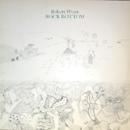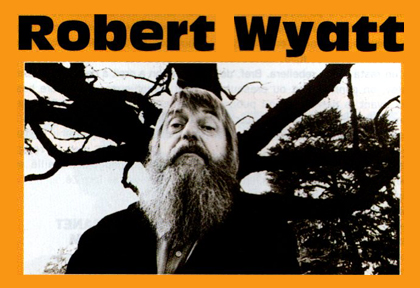| |

Rock Bottom/Ruth Is Stranger Than Richard (Reedition LP)
1981
Robert Wyatt
|
|
|
| |
BLAH BLAH NEWS - juillet-août 1998
Robert Wyatt -
Rock Bottom
Robert Wyatt -
Ruth Is Stranger Than Richard
Ryko/Harmonia Mundi
|
|
Robert Wyatt, batteur et deuxième chanteur de Soft Machine jusqu'au volume six (sic), entama tragiquement une carrière solo qui ne fut pas ce qu'elle aurait dû être.
|

|
Paralysé après une chute, Wyatt eut du mal à concilier musique, déplacements et vie normale. C'est néanmoins avec un grand courage et surtout l'aide de musiciens, des Pink Floyd aux Roxy Music, que Wyatt réalisa avec ces deux albums une autre musique très éloignée de la pop ou même de quoi que ce soit d'autre. On obtient une musique purement mentale, une musique organique qui fait appel à tout ce qu'il y a de plus sensible au fond de chaque être humain. Robert Wyatt possédait une voix d'alto, et il a merveilleusement trouvé le moyen de s'en servir. Il a écrit la seule musique qui pouvait aller avec. La réédition de ces deux monuments donne une idée de la créativité du bonhomme, car vingt-cinq ans plus tard, rien n'a vieilli. Ni la voix, ni le traitement. Ces disques sont deux chimères à saisir au passage. Les plus vieux se souviendront du poignant concert au théâtre des Champs-Elysées et de Wyatt dans son fauteuil roulant.
| |
THE WIRE - June 1998
Robert Wyatt -
Rock Bottom -
HANNIBAL HNCO1426 CD
Robert Wyatt -
Ruth Is Stranger Than Richard -
HANNIBAL HNCD1427 CD
Clive Bell
|
|
A few years ago Robert Wyatt, always the frankest and most open of interviewees, spoke about the accident which left him paralysed at age 27. "Suddenly I became middle-aged Overnight. So I'm stuck with the experience of a 27 year old in the early 70s, and I've just got to make that work now forever. That's the oddest thing. Not being able to grow up fully in the way I imagine I might have done."
Rock Bottom, now reissued with new cover art and Wyatt's good essay about its history, was written and recorded on either side of that accident. One of its concerns opposes babies vs adults, articulating a kind of rage at having to grow up. On the opening "Sea Song" Wyatt compares his beloved to a fish ("partly porpoise, partly baby sperm whale"). He likes her drunk, and escapes from adulthood into intoxication, but can't understand her the next morning when she turns into a grumpy adult. Throughout the record the music strains to escape through long scalar progressions, always going further than you would expect, either upwards ("Sea Song") or down ("A Last Straw") to the very bottom of the piano and the seabed.
The outro of "Sea Song" moves with simple logic from 4/4 to a swaying 11/4, creating a watery kind of seaweed dance for Wyatt to scat over. In his sleevenote essay, Wyatt recalls the watery vibrato of the little keyboard he was writing on in 1972, making a connection to the shimmering lagoon of Venice outside his window. (Nicholas Roeg was there at the same time, shooting the sinister tragedy Don't Look Now.)
By the time we reach "Alifib/Alife", with its rhythm built from the sound of breathing, Wyatt has regressed into baby language Words disintegrate ("No nit not") with an almost painful intimacy while he serenades the woman as "my larder". Wyatt brings off this strange tightrope act through the eerie, childlike conviction of his singing, and the sheer beauty of the melody. Gary Windo's tenor sax sounds like it's trying to be born. The woman gets a chance to answer back: she is neither his larder nor his dinner, and she criticises his silly baby language ("And what's a bololey when it's a folly?"). But when this adult woman appears, the rhythm immediately stops and the muse dissipates. The adult drives away the watery baby world. But finally the woman agrees to play along and accepts the baby language ("I'm Alife, your guarder').
Ivor Cutler's Scots singing of the sturdy anthem at the close of the album (over Fred Frith's viola chords) provides a hymn-like resolution. But even this is a song of rage and struggle against the contents of the adult world (cars, TV, phones...). It all ends suddenly on a weird cackling laugh.
If Rock Bottom is an example of self-indulgence and talented narcissism producing great art, Ruth Is Stranger Than Richard is a more social occasion. Slightly less of a unified and personal project, here Wyatt shares composing credits with Frith, Mongezi Feza, Offenbach and others. But songs like "Muddy Mouth" and "Team Spirit" are still vintage Wyatt. "Muddy Mouth" offers a James Joycean vision of the anti-hero Handy masturbating by the canal, leading to the sea, leading to oceans: "Even under oaf Handy lies," sings Wyatt, the melody dropping down the scale into a bog.
These songs empathise with victims "Soup Song" is sung by a joint of bacon outraged at being thrown into a pot of soup. "Team Spirit" evokes school football matches and privates in trench warfare, and the singer feels booted about like a football. Again resolution comes at the close, in the wordless, hymn-like version of "Song For Che" by Charlie Haden.
| |
NEW MUSICAL EXPRESS - 18 April 1981
Robert Wyatt: Rock Bottom / Ruth Is Stranger Than Richard (Virgin)
Richard Cook
|
|
THE REAPPEARANCE of Robert Wyatt's two Virgin albums (1974-5 vintage), now in a double package, is as welcome as a spring day after a relentless winter.
Rock Bottom is participatory. It's built around elementals: small groupings of players drop in and out of focus, with the mantric swirl of Wyatt's keyboards as constant. The aching vulnerability of his singing invites reactions – sharing, generous – this is no clarion call to sentiment! The gentle ebb and flow of 'Alifib/Alife' elicits a human response from machine and metal: the pristine clarity of Hugh Hopper's bass, Gary Windo's plaintive reeds. It seeps into the farewell of 'Little Red Robin Hood Hit The Road', Mike Oldfield's spindly guitar lines a centrepin of proud sorrow before resolution in Ivor Cutler's wide-eyed nursery rhyme.
But this is mere chalk and pins guidance. You're asked to make your own way through the fierce forest of trumpets that Mongezi Feza spreads over 'Little Red Riding Hood Hit The Road', choose your own meaning for the slender half-sense of the lyrics. Intensely personal, uniquely open-hearted, there is no other record like Rock Bottom.
The second album is more sharply drawn, perhaps less easily embraced. Side Ruth runs a twisted jazz-based course; the lilting swing of 'Sonia' gives way to a palpable wilderness of pain in 'Team Spirit', a jab in the guts of remorse settled by the serene dignity of Charlie Haden's 'Song For Che'. Side Richard's voice-piano extemporisations are the counterweight, unfolding like the sepia-toned pages of a forgotten diary.
If these records spell out a sadness that seems to border on despair they are, equally, uplifting in Wyatt's resolve to come to terms with his situation and the simple triumph of creating music of true beauty.
| |
Q, August 1989
Robert Wyatt: Rock Bottom / Ruth Is Stranger Than Richard (Virgin)
Martin Aston
|
|
NOW ON CD: how Robert Wyatt found beauty in the aftermath of personal disaster.
Robert Wyatt's five luminous and investigative years as Soft Machine's drummer/vocalist and subsequently as instigator behind Matching Mole's two albums literally took a tumble – from out of a third floor window at a party given by the ex-Soft Machine/Gong man Daevid Allen, to be exact. Tragic circumstances in rock circles usually end in death, with all artistic achievements suspended in aspic, and Wyatt would have undoubtedly been an "example" of a true British progressive musician (Canterbury Arts division), but permanent paralysis from the waist down only put an end to Wyatt's drumming, not his mind.
Self-explanatory and gravely humorous in its choice of title, Rock Bottom was composed during six arduous, painful months of hospital recovery and rehabilitation; it's no wonder the album's mood is deeply personal, traumatic and yet uncannily dignified and resolute, with his wife Alfie's cover painting of three playful teenage girls at the beach above a handful of sea plants rooted to the seabed the most unnerving of reflections.
You'll have to travel inside albums such as John Lennon's Plastic Ono Band and Van Morrison's Astral Weeks to find equivalent states of raw self-examination, although Rock Bottom is painted with very different hues. Several Matching Mole songs predated this calming but emotionally quivering sound, etched out by Wyatt's distinctively plaintive English warble over a probing bass, simmering keyboards and fragile percussion – Wyatt finds odd objects like a tray, battery or "Jamie's drum" for percussion, or dispenses with rhythms altogether – but Rock Bottom stretches the mood further out. The sound of a genuinely new kind of electronic, minimalist jazz, it's something like the tide on the album cover, and has the therapeutic effect of an isolation tank.
There are only six tracks; 'Alifib' and 'Alife' are aching drifts, dominated by breathing and childlike mutterings, 'Sea Song' is another beautifully drifting paean to Alf, 'A Last Straw' shifts gears with an almost military drum pattern (by Laurie Allen) while 'Little Red Riding Hood Hits The Road' and its Red Robin Hood counterpart over on side two are more congested, ensemble pieces, the former driven by Mongezi Feza's trumpet beside Wyatt's delirious babble, as physical pain gives way to painful guilt, the latter resting on Mike Oldfield's long and winding guitar, but both coloured by Ivor Cutler's inspired nursery rhyme of a narrative.
From 1974, Ruth Is Stranger Than Richard was naturally more outgoing and playful, revising Soft Machine's jazz-rock structures and improvisations and collaborating with new-found allies, instrumentally like Gary Windo on sax and clarinet throughout, and in writing, like Fred Frith on the four-part 'Muddy Mouse A'/'Muddy Mouse B', ex-Softie bassist Hugh Hopper on the bluesy shuffle 'Soup Song', while Mongezi Feza's 'Sonia' and Charlie Haden's 'Song For Che' are treated with a solemn reverence. Wyatt's only solo piece, 'Solar Flares', like 'Muddy Mouse C', maintains Rock Bottom's restless, resolving motion.
Over 15 years on, there has never been anything quite like the effect of this pair, and one realises there never will be. Wyatt soon wheeled himself on to Top Of The Pops with, of all things, The Monkees' 'I'm A Believer', and then off toward Communist agit-pop, witnessed by his only other hit, Elvis Costello's 'Shipbuilding'. Another unique English musical eccentric a waits your undivided attention.
|



